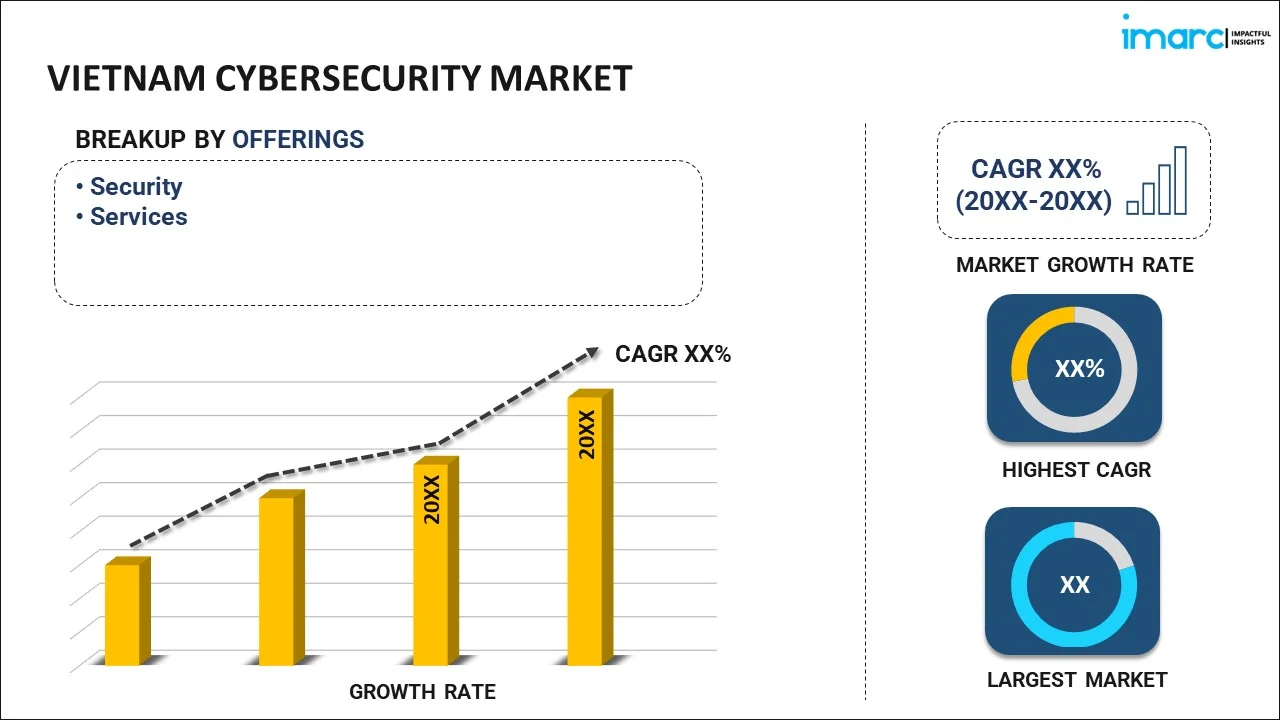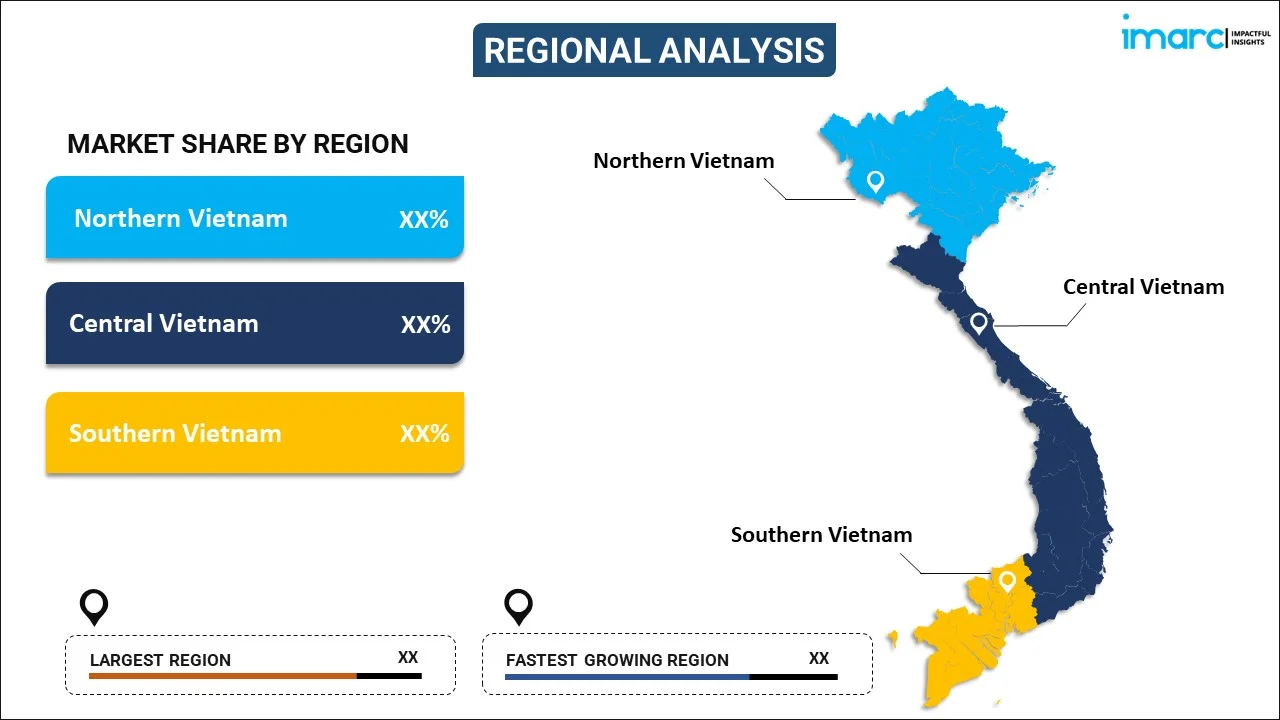
Vietnam Cybersecurity Market Report by Offering (Security, Services), Deployment (Cloud-based, On-premises), End User (BFSI, Healthcare, Manufacturing, Government and Defense, IT and Telecommunication, and Others), and Region 2025-2033
Market Overview:
Vietnam cybersecurity market size is projected to exhibit a growth rate (CAGR) of 14.45% during 2025-2033. The increasing internet penetration, digital transformation, rising cyber-attacks, regulatory compliance, public awareness, advanced technologies, infrastructure modernization, international partnerships, social media usage, and third-party vendors represent some of the key factors driving the industry.
|
Report Attribute
|
Key Statistics
|
|---|---|
|
Base Year
|
2024 |
|
Forecast Years
|
2025-2033
|
|
Historical Years
|
2019-2024
|
| Market Growth Rate (2025-2033) | 14.45% |
Cybersecurity refers to the comprehensive set of practices, technologies, and policies deployed to protect computer systems, networks, and data from unauthorized access, disruption, or damage. It is an ever-evolving discipline given the increasingly complex nature of cyber threats, making it crucial for both individual users and organizations. At its core, cybersecurity adopts a multi-layered approach, also known as "defense in depth," designed to provide an integrated line of defense against a variety of vulnerabilities. This approach encompasses physical security measures, network security protocols, secure coding practices, and operational procedures to ensure data integrity and confidentiality. One of the salient features of modern cybersecurity solutions includes the use of advanced firewalls, intrusion detection and prevention systems, and encryption technologies. Additionally, multi-factor authentication methods provide an extra layer of security by requiring multiple forms of verification before granting access. In the rapidly advancing realm of cybersecurity, artificial intelligence and machine learning algorithms are increasingly being integrated to anticipate, identify, and counteract cyber threats in real-time. Moreover, regulatory compliance and governance frameworks play an essential role in defining the minimum-security standards that must be met. Given that cyber threats continue to grow in sophistication, cybersecurity remains a dynamic field requiring continuous updates and upgrades, making it a focal point for research and investment.
Vietnam Cybersecurity Market Trends:
The increasing reliance on digital platforms and networks for business and personal activities represents one of the key factors driving the growth of the cybersecurity market in Vietnam. Coupled with this, innovations in cybersecurity technology aimed at enhancing intrusion detection and data encryption are acting as major growth inducing factors. Moreover, a strong focus on digital governance, backed by government and private stakeholders, is facilitating the adoption of comprehensive cybersecurity measures. Sophisticated analytics in cybersecurity platforms provide actionable insights into threats, making these solutions more proactive and effective, thereby encouraging organizations to adopt advanced cybersecurity measures. The rising incidents of cyber-attacks and data breaches are catalyzing the demand for specialized cybersecurity solutions. Along with this, community-based online platforms and public digital services are also contributing to localized growth in cybersecurity needs. Besides this, high social media engagement levels require secure platforms. Advanced monitoring tools, including threat intelligence and automated incident response, are increasingly integrated into cybersecurity solutions, further strengthening the market. The cybersecurity market is making inroads into rural and semi-urban areas as internet penetration increases, thus broadening its consumer base. The drive for secure, reliable digital transactions is propelling the demand for advanced cybersecurity solutions. Additionally, government incentives, such as funding for cybersecurity startups and public awareness campaigns, are creating a positive market outlook. Critical sectors like e-commerce, financial services, and healthcare are adopting stringent cybersecurity protocols, thereby enriching the market landscape. The emerging middle-class population, increasingly engaged in online activities, is also contributing to market growth. Other factors such as educational initiatives to improve public awareness and strategic partnerships with global cybersecurity entities are bolstering the growth of the cybersecurity market in Vietnam.
Vietnam Cybersecurity Market Segmentation:
IMARC Group provides an analysis of the key trends in each segment of the market, along with forecasts at the country level for 2025-2033. Our report has categorized the market based on offering, deployment, and end user.
Offering Insights:

- Security
- Network Security
- Cloud Application Security
- End-point Security
- Secure Web Gateway
- Application Security
- Others
- Services
The report has provided a detailed breakup and analysis of the market based on the offering. This includes security (network security, cloud application security, end-point security, secure web gateway, application security, and others) and services.
Deployment Insights:
- Cloud-based
- On-premises
A detailed breakup and analysis of the market based on the deployment have also been provided in the report. This includes cloud-based and on-premises.
End User Insights:
- BFSI
- Healthcare
- Manufacturing
- Government and Defense
- IT and Telecommunication
- Others
The report has provided a detailed breakup and analysis of the market based on the end user. This includes BFSI, healthcare, manufacturing, government and defense, IT and telecommunication, and others.
Regional Insights:

- Northern Vietnam
- Central Vietnam
- Southern Vietnam
The report has also provided a comprehensive analysis of all the major regional markets, which include Northern Vietnam, Central Vietnam, and Southern Vietnam
Competitive Landscape:
The market research report has also provided a comprehensive analysis of the competitive landscape in the market. Competitive analysis such as market structure, key player positioning, top winning strategies, competitive dashboard, and company evaluation quadrant has been covered in the report. Also, detailed profiles of all major companies have been provided. Some of the key players include:
- Dell Inc.
- FPT Software Company Limited (FPT Corporation)
- HPT Vietnam Corporation
- Microsoft Corporation
- Viettel Cyber Security Company
(Please note that this is only a partial list of the key players, and the complete list is provided in the report.)
Vietnam Cybersecurity Market Report Coverage:
| Report Features | Details |
|---|---|
| Base Year of the Analysis | 2024 |
| Historical Period | 2019-2024 |
| Forecast Period | 2025-2033 |
| Units | Million USD |
| Scope of the Report | Exploration of Historical and Forecast Trends, Industry Catalysts and Challenges, Segment-Wise Historical and Predictive Market Assessment:
|
| Offerings Covered |
|
| Deployments Covered | Cloud-based, On-premises |
| End Users Covered | BFSI, Healthcare, Manufacturing, Government and Defense, IT and Telecommunication, Others |
| Regions Covered | Northern Vietnam, Central Vietnam, Southern Vietnam |
| Companies Covered | Dell Inc., FPT Software Company Limited (FPT Corporation), HPT Vietnam Corporation, Microsoft Corporation, Viettel Cyber Security Company, etc. |
| Customization Scope | 10% Free Customization |
| Post-Sale Analyst Support | 10-12 Weeks |
| Delivery Format | PDF and Excel through Email (We can also provide the editable version of the report in PPT/Word format on special request) |
Key Questions Answered in This Report:
- How has the Vietnam cybersecurity market performed so far and how will it perform in the coming years?
- What has been the impact of COVID-19 on the Vietnam cybersecurity market?
- What is the breakup of the Vietnam cybersecurity market on the basis of offering?
- What is the breakup of the Vietnam cybersecurity market on the basis of deployment?
- What is the breakup of the Vietnam cybersecurity market on the basis of end user?
- What are the various stages in the value chain of the Vietnam cybersecurity market?
- What are the key driving factors and challenges in the Vietnam cybersecurity?
- What is the structure of the Vietnam cybersecurity market and who are the key players?
- What is the degree of competition in the Vietnam cybersecurity market?
Key Benefits for Stakeholders:
- IMARC’s industry report offers a comprehensive quantitative analysis of various market segments, historical and current market trends, market forecasts, and dynamics of the Vietnam cybersecurity market from 2019-2033.
- The research report provides the latest information on the market drivers, challenges, and opportunities in the Vietnam cybersecurity market.
- Porter's five forces analysis assist stakeholders in assessing the impact of new entrants, competitive rivalry, supplier power, buyer power, and the threat of substitution. It helps stakeholders to analyze the level of competition within the Vietnam cybersecurity industry and its attractiveness.
- Competitive landscape allows stakeholders to understand their competitive environment and provides an insight into the current positions of key players in the market.
Need more help?
- Speak to our experienced analysts for insights on the current market scenarios.
- Include additional segments and countries to customize the report as per your requirement.
- Gain an unparalleled competitive advantage in your domain by understanding how to utilize the report and positively impacting your operations and revenue.
- For further assistance, please connect with our analysts.
 Request Customization
Request Customization
 Speak to an Analyst
Speak to an Analyst
 Request Brochure
Request Brochure
 Inquire Before Buying
Inquire Before Buying




.webp)




.webp)












